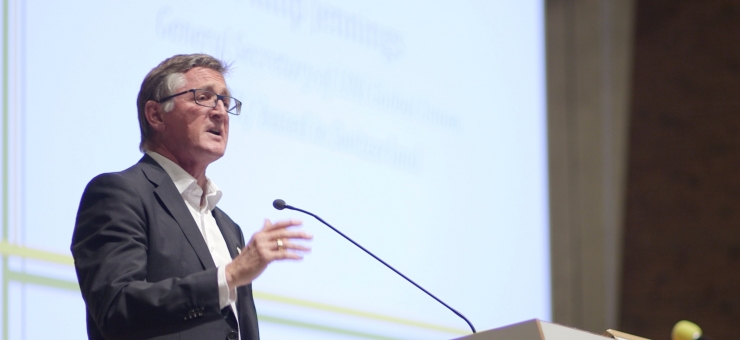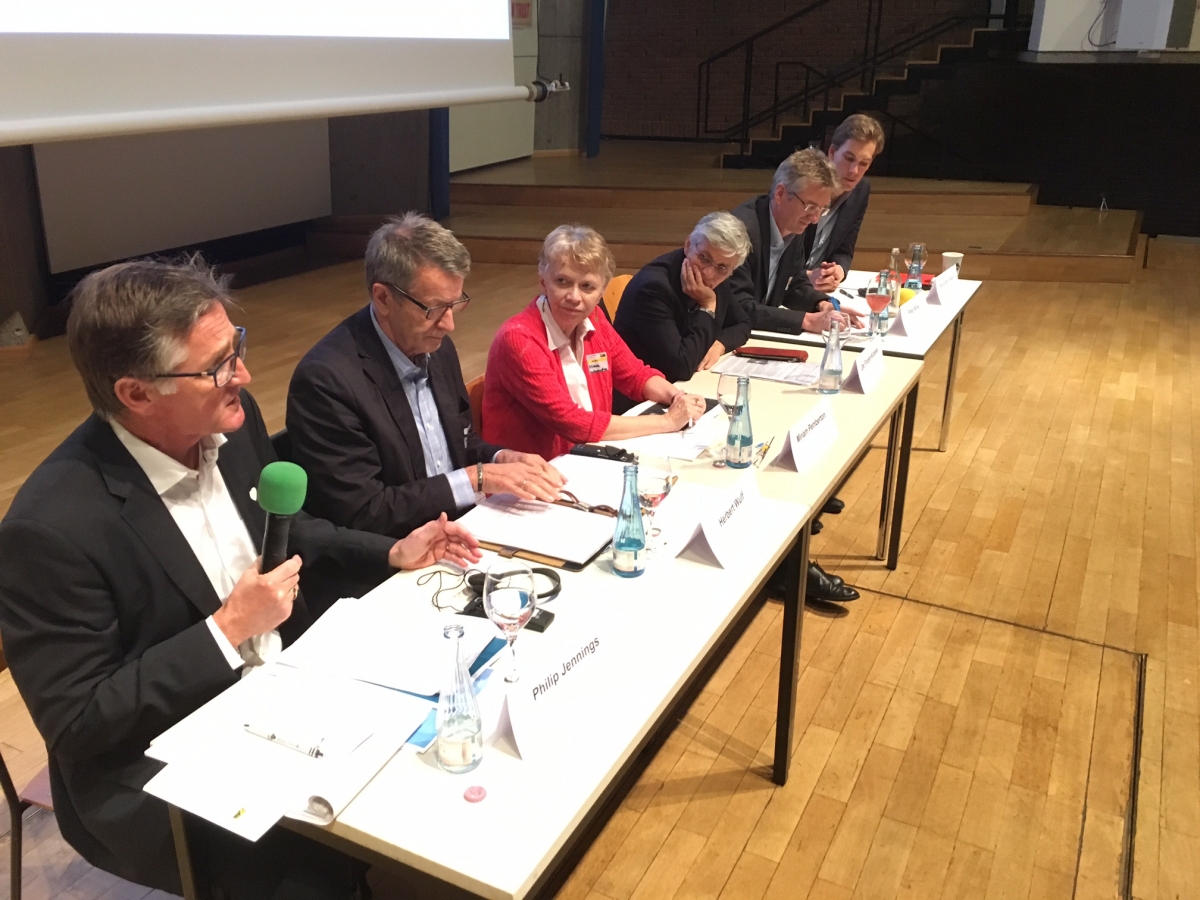News
Jennings to World Peace Congress, Berlin: ‘There is so much that unites us – let us work together to win’

UNI Global Union General Secretary Philip Jennings closed the three-day World Peace Congress organized by the Nobel Peace Prize winners the International Peace Bureau in Berlin with a rousing call for peace activists and trade unionists to unite to create the just and peaceful world that both movements believe in.
Referring to UN Secretary General Ban Ki-Moon’s oft repeated phrase that the world is over-armed and peace under-funded, Jennings said, “Yes, the world is over-armed and peace under-funded – but workers are also underpaid and undervalued. However, we are fighting, mobilising and building.”
“The commitment of the trade union movement to peace is unequivocal. This is demonstrated by the level of trade union involvement at the Berlin Congress – with labour leaders from the ITUC, ver.di, DGB, Japan and a strong involvement of young leaders.”
Jennings said he was proud that trade unionists stood up for peace around the world. This was demonstrated by the largest protest ever in the UK – with 2 million marching against the Iraq War.
“We share so much - bread, peace, freedom. We fight for justice and equality, we fight against discrimination in all its forms. We question the structure of power in the world and want to take it back for the people: we never give up,” he added.
Jennings condemned the attacks on human rights and the closing down of democratic spaces, citing Korea and Brazil as particularly negative examples. He went on to describe his recent meetings with imprisoned Korean union leader Han Sang-gyun and former Brazilian President Lula who are both under attack from targeted and well-funded assaults on freedom and democracy.
“We condemn the economic violence of neo-liberalism which in recent times has brought 124 systemic bank crises, 208 currency crises and 63 sovereign debt crises. The peace and union movement share condemnation of an unstable, unfair, unethical tax dodging corporate globalisation, evidenced by the corrupt “Panama Papers” capitalism of today.
“We share opposition to the haters, the wall builders, the racists, xenophobes and fascists. We share the love of our planet and the reality that there are no jobs on a dead planet. We share the love of humanity, and say refugees are welcome here. We share the dream for the realization of true gender equality wherever decisions are made and we condemn the use of women as instruments of war.”
On military spending, where $1.7 trillion was spent in 2015, Jennings was equally forthright, saying, “Spending vast amounts of money on military procurement and pushing arms sales does not enhance security - it fuels conflict, supports repression and makes the world a more dangerous place,” he said. “The world faces so many risks from climate change to inequality that are beyond simple military solutions.”
Jennings said that another world was possible, citing the SDGs, progress on climate change through COP21 and the duty for business to respect human rights with the Ruggie Principles. Working people and their unions are integral to solutions from defence diversification to conversion where the principle of a just transition is key.
“UNI Global Union is clear, our organisation says no to nuclear weapons – we support the work of ICAN, and back in 2010 took two thousand trade unionists to Nagasaki to touch and feel the evil that nuclear war perpetrates on people. We are proud to be part of the push for a global treaty to ban nuclear weapons.”
Jennings said that UNI was committed to creating a world of decent work and peace.
“Decent work is vital to promoting peace preventing crises, enabling recovery and building resilience. Workers’ rights and peace are part of basic human rights. Social protection, collective bargaining and strong unions are part of the pathway to peace.”
The UNI Global Union General Secretary concluded that we can break through for both peace and decent work. He gave a number of examples where unions have broken through for peace including Ireland, South Africa, Tunisia and most recently Colombia.
Finally, he reminded peace activists gathered in Berlin that it was Gandhi’s birthday, quoting him:
“First they ignore you. Then they laugh at you. Then they fight you, and then you win!”
Earlier in the day, Jennings co-moderated a session on conversion with FES’s Alexander Geirge, Arms Conversion Reloaded: Turning Swords into Ploughshares in the 21st Century. The panel included Ute Finckh-Krämer of the German Bundestag, Miriam Pemberton, Director of the Peace Economy Transitions Project, Herbert Wulf, the former director of the Bonn International Center for Conversion and Peter Wilke, the CEO of WMP Consult.

Participants of the International Peace Bureau World Congress also created a peace sign outside Berlin’s Technical University by using mobile phone lights and torches.

For more details about the event and the final statement please see IPB website.

